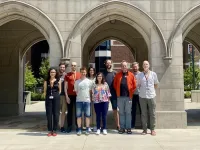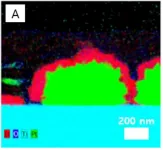(Press-News.org) New research suggests that the immune system’s ability to respond to spinal cord injuries diminishes with age – and identifies potential avenues to improve that response and help patients heal.
The new findings offer important insights into how the immune system responds to spinal-cord injuries, and why that response becomes blunted with the passing years. Further, it reveals an important role for the membranes surrounding the spinal cord in mounting the immune response to spinal-cord injury. With this information, doctors one day may be able to bolster the body’s natural immune response to improve patient outcomes, particularly among older adults.
“Recently, it has been reported more aging individuals experience spinal cord injuries. Our findings suggest in aging, there is an impairment in how the immune response is initiated and resolved compared to young,” said researcher Andrea Francesca M. Salvador, who just received her PhD from the University of Virginia School of Medicine. “Hopefully, our results can help identify points of intervention and druggable targets that can improve recovery and address long-term consequences of injury such as pain.”
Understanding Spinal Cord Injuries
Spinal-cord injuries can have devastating, lifelong effects, leaving patients unable to move, unable to control their bowels or suffering pain, sexual dysfunction or uncontrollable spasms, depending on the severity and location of the injury. Better understanding how the body responds to spinal-cord injuries is an important step in developing better ways to treat them.
The new findings are the latest from the lab of Jonathan Kipnis, PhD, who made a stunning discovery at UVA in 2015 that the brain was connected to the immune system by vessels long thought not to exist. Prior to this game-changing revelation, the brain had been held to be essentially walled off from the immune system. The discovery of the unknown vessels in the membranes, or meninges, surrounding the brain rewrote textbooks and opened a whole new frontier in neurological research. Today, “neuroimmunology,” or the study of the nervous system’s relationship to the immune system, is one of the hottest areas of neuroscience research, and it is poised to transform our understanding of – and ability to treat – a vast array of neurological diseases.
Now Salvador, Kipnis and their collaborators have determined that the meninges surrounding the spinal cord play an essential role in the immune response to spinal-cord injury. They discovered, for example, that previously unknown meningeal lymphatic “patches” form above the site of spinal-cord injuries. More research is needed to determine exactly what these structures do, but their formation speaks to an important role for the spinal-cord meninges in the immune response to injury.
Further, Salvador and her collaborators quantified how immune cells respond to spinal-cord injuries. They found that this response was much stronger in young lab mice than in older ones, suggesting that scientists may be able to target certain immune cells to improve recovery after spinal-cord injuries.
Together, the findings identify the spinal-cord meninges – and their interactions with other components of the central nervous system – as exciting new areas for researchers to explore as they seek to better understand the body’s complex response to spinal-cord injuries.
“This is an exciting finding and one which may indeed lead to new therapeutic approaches for spinal cord-injury patients,” said Kipnis, now a professor at Washington University School of Medicine in St. Louis and director of its Brain Immunology and Glia Center (BIG Center). “We are now collaborating with clinicians in a hope to better understand what is happening in human patients and how our findings could be translated to make a real difference.”
Findings Published
The researchers have published their findings in the scientific journal Neuron. The team consisted of Salvador, Taitea Dykstra, Justin Rustenhoven, Wenqing Gao, Susan M. Blackburn, Kesshni Bhasiin, Michael Q. Dong, Rafaela Mano Guimarães, Sriharsha Gonuguntla, Igor Smirnov, Kipnis and Jasmin Herz. The researchers report no financial interests in the work.
The research was supported by a Howard Hughes Medical Institute Medical Research Fellowship and by the National Institutes of Health, grants AT010416, AG034113, NS096967 and AG057496.
To keep up with the latest medical research news from UVA, subscribe to the Making of Medicine blog
END
Immune system discovery could benefit spinal cord injuries
2023-06-02
ELSE PRESS RELEASES FROM THIS DATE:
UTHSC researchers’ work on human pangenome aids understanding of common chromosomal abnormality
2023-06-02
Researchers from the University of Tennessee Health Science Center have made a foundational discovery about chromosome biology through their work on the first-ever human pangenome reference.
Published recently by the Human Pangenome Reference Consortium in the journal Nature, the draft pangenome uses complete genome assemblies to provide a diverse look at the genetic makeup of humans. Researchers in the UTHSC Department of Genetics, Genomics and Informatics created the technical tools to build the pangenome, and then used the tools to understand variation in parts of the genome that could not be seen before.
The pangenome ...
Mysterious dashes revealed in Milky Way’s center
2023-06-02
New radio telescope images reveal hundreds of filaments along the galactic plane, each measuring 5 to 10 light-years in length
These structures likely originated a few million years ago when outflow from our supermassive black hole interacted with surrounding materials
Researcher: ‘I was actually stunned when I saw these’
EVANSTON, Ill. — An international team of astrophysicists has discovered something wholly new, hidden in the center of the Milky Way galaxy.
In the early 1980s, Northwestern University’s Farhad Yusef-Zadeh discovered gigantic, one-dimensional filaments dangling vertically near Sagittarius A*, our ...
ASCO: Adding ribociclib to hormone therapy improves outcomes in patients with early breast cancer
2023-06-02
A study involving UCLA Jonsson Comprehensive Cancer Center researchers found when ribociclib, a targeted therapy drug, is added to hormone therapy there are a significant invasive disease-free survival benefit in patients with early hormone-receptor (HR) positive/HER2 negative breast cancer.
Researchers found that patients who took the combination therapy had substantially longer invasive disease-free survival compared to those who were treated with the hormone therapy alone, regardless of whether the cancer has spread to the lymph nodes. The addition of the targeted therapy reduced the risk of recurrence by 25%.
The results were shared today during the American Society of Clinical ...
New research suggests wheat crops may be threatened by unprecedented heat and drought
2023-06-02
The world is getting hotter, causing shifts in seasonal patterns and increasing the amount of extreme weather such as severe droughts and heat waves, which can affect crop yields and food supplies. A recent study led by a researcher at the Friedman School of Nutrition Science and Policy at Tufts University found that the likelihood of extreme temperatures that could affect crop yields has increased significantly in wheat-producing regions of the U.S. and China.
The findings predict heat waves that happened approximately ...
Eventually everything will evaporate, not only black holes
2023-06-02
New theoretical research by Michael Wondrak, Walter van Suijlekom and Heino Falcke of Radboud University has shown that Stephen Hawking was right about black holes, although not completely. Due to Hawking radiation, black holes will eventually evaporate, but the event horizon is not as crucial as had been believed. Gravity and the curvature of spacetime cause this radiation too. This means that all large objects in the universe, like the remnants of stars, will eventually evaporate.
Using a clever combination of quantum physics and Einstein’s theory of gravity, Stephen Hawking argued that the spontaneous creation and annihilation ...
Underwater forest's recovery offers hope for marine restoration across the globe
2023-06-02
Human activity has degraded ecosystems and damaged biodiversity around the world, but ecosystem restoration offers hope for the future. Scientists studying the restoration of underwater seaweed forests which provide other species with food and shelter have found that 10 years of restoration efforts have helped a damaged forest regrow to richness and strength comparable to forests that have never been disturbed.
“Macroalgal forests are found along over one-third of the world’s coastlines and underpin ...
Developing technologies to reduce the cost of green hydrogen production
2023-06-02
Green hydrogen, which produces hydrogen without the use of fossil fuels or the emission of carbon dioxide, has become increasingly important in recent years as part of efforts to realize a decarbonized economy. However, due to the high production cost of water electrolysis devices that produce green hydrogen, the economic feasibility of green hydrogen has not been very high. However, the development of a technology that drastically reduces the amount of rare metals such as iridium and platinum used in polymer electrolyte membrane water electrolysis devices is opening the way to lower production costs.
A research team led by Dr. Hyun S. Park and Sung Jong ...
ASCO 2023 - Sylvester Comprehensive Cancer Center experts available for interviews
2023-06-02
Sarcomas
Dr. Jonathan C. Trent, a medical oncologist specializing in Sarcoma and Connective Tissue Medical Oncology at Sylvester, is available to discuss a wide range of issues related to Sarcoma research and experimental therapeutics. He and collaborators are involved in multiple ASCO23 presentations, including:
Multi-omic characterization of gastrointestinal stromal tumor (GIST) in a large real-world patient cohort.
Outcomes in patients with advanced gastrointestinal stromal tumor who did not have ...
Alcohol dependency in adolescence, but not consumption, linked with later depression risk
2023-06-02
Adolescents who show signs of alcohol dependence are more likely to develop depression by their mid-20s, according to a new study led by UCL (University College London) and University of Bristol researchers.
Drinking large amounts of alcohol regularly, but with no signs of dependency, did not predict depression risk, according to the findings published in The Lancet Psychiatry.
Co-lead author Dr Gemma Lewis (UCL Psychiatry) said: “By using a large, longitudinal dataset, we have found evidence that problematic drinking patterns in late adolescence may increase the risk of developing ...
Why we need to fall out of love with flaky white fish - study
2023-06-02
The UK’s growing mismatch between the fish we catch and the fish we want to eat has clear implications for our future food security, according to new research.
Led by the University of Essex and the Centre for Environment Fisheries and Aquaculture Science (Cefas), the study, published in the international peer-reviewed journal Reviews in Fish Biology and Fisheries, for the first time offers a comprehensive, long-term analysis of how major policy changes in the past 120 years have influenced patterns in UK seafood production, trade and consumption.
It shows that even if we changed our fish-eating habits away from choosing flaky white fish such as cod ...


